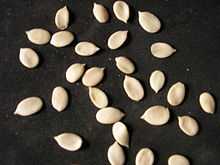Egusi


Egusi seeds are the fat- and protein-rich seeds of certain cucurbitaceous (squash, melon, gourd) plants. Authorities disagree whether the word is used more properly for the seeds of the colocynth, those of a particular large-seeded variety of the watermelon, or generically for those of any cucurbitaceous plant. The characteristics and uses of all these seeds are broadly similar.
Egusi soup is a kind of soup thickened with the ground seeds and popular in West Africa, with considerable local variation. Besides the seeds, water, and oil, egusi soup typically contains leaf vegetables, other vegetables, seasonings, and meat. Typical leaf vegetables for egusi soup include bitterleaf, celosia and spinach. Typical other vegetables include tomatoes and okra. Typical seasonings include chili peppers, onions, and iru (fermented beans). Typical meats include beef, goat, fish, shrimp, or crayfish.
In Nigeria, Egusi is very popular among the Igbo ethnic group of Southeastern Nigeria, the Ibibio people and the Efik people (Calabar people) of Southern Nigeria, and the Yoruba people of the Southwest of Nigeria. Other ethnic groups in Nigeria including the Hausa of Northern Nigeria also use egusi in their local cuisine.
Yoruba people in general and quite notably the people of Ọṣun State, especially the Ijeshas love eating Iyan & Egusi (Pounded Yam & Egusi Soup).
_served_in_Birmingham_UK.JPG)
In the late 1980s, the Canadian government funded a project intended to develop a machine to help Cameroonians shell egusi seeds.[1] A machine has been developed in Nigeria to shell egusi. [citation needed]
References
See also
- Pumpkin seeds